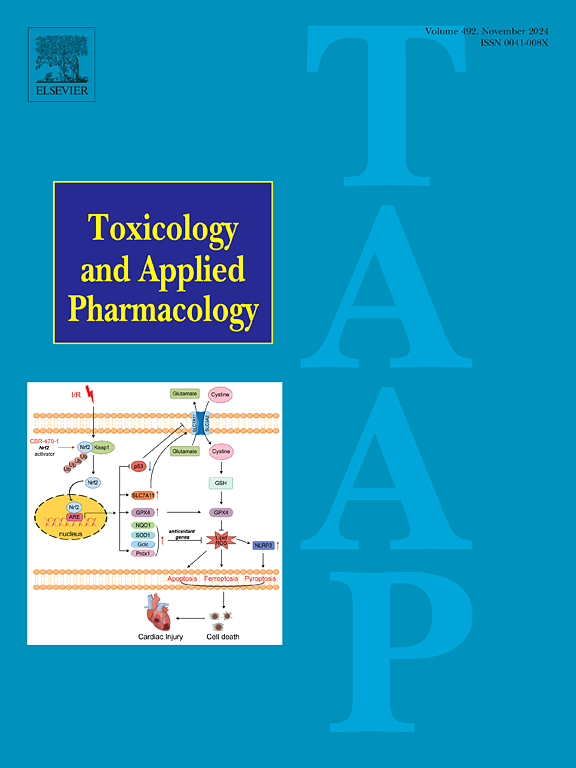Miconazole alleviates colitis by suppressing colonic senescence, NF-κB Signaling and gut microbiota modulation
IF 3.4
3区 医学
Q2 PHARMACOLOGY & PHARMACY
引用次数: 0
Abstract
Ulcerative colitis (UC) is a chronic relapsing non-transmural inflammatory bowel disease characterized by bloody diarrhea, closely associated with intestinal epithelial cell senescence and chronic inflammation. This study reveals novel mechanisms of the imidazole antifungal drug Miconazole (MCZ) in UC treatment. Through compound library screening, we found that MCZ effectively inhibits dextran sulfate sodium (DSS)-induced senescence in colonic epithelial NCM460 cells. Although clinically used for over 40 years, its anti-senescence and anti-inflammatory mechanisms remain unclear. Experiments confirmed that MCZ significantly reduces DSS-induced SA-β-Gal-positive cell proportion and P16/P21 expression. In animal models, MCZ ameliorated DSS-induced weight loss, bloody stools, and colonic tissue damage. Mechanistic studies demonstrated that MCZ specifically modulates microbiota composition (enriching beneficial bacteria Adlercreutzia, Lactobacillus, Ligilactobacillus, and Limosilactobacillus, while suppressing the relative abundance of Mycoplasma, Oscillibacter, and Streptococcus), and inhibits inflammatory progression by blocking the phosphorylation cascade of the NF-κB signaling pathway. These findings not only reveal MCZ's novel anti-senescence and anti-inflammatory functions but also provide potential new strategies for UC treatment.
咪康唑通过抑制结肠衰老、NF-κB信号传导和肠道菌群调节来缓解结肠炎
溃疡性结肠炎(UC)是一种以带血腹泻为特征的慢性复发性非跨壁炎症性肠病,与肠上皮细胞衰老和慢性炎症密切相关。本研究揭示了咪唑类抗真菌药物咪康唑(Miconazole, MCZ)治疗UC的新机制。通过化合物文库筛选,我们发现MCZ能有效抑制DSS诱导的结肠上皮NCM460细胞衰老。虽然临床使用超过40年,其抗衰老和抗炎机制尚不清楚。实验证实MCZ可显著降低dss诱导的SA-β- gal阳性细胞比例和P16/P21表达。在动物模型中,MCZ改善了dss引起的体重减轻、血便和结肠组织损伤。机制研究表明,MCZ特异性调节微生物群组成(富集有益菌Adlercreutzia、Lactobacillus、liilactobacillus和Limosilactobacillus,同时抑制支原体、Oscillibacter和链球菌的相对丰度),并通过阻断NF-κB信号通路的磷酸化级联抑制炎症进展。这些发现不仅揭示了MCZ抗衰老和抗炎的新功能,也为UC的治疗提供了潜在的新策略。
本文章由计算机程序翻译,如有差异,请以英文原文为准。
求助全文
约1分钟内获得全文
求助全文
来源期刊
CiteScore
6.80
自引率
2.60%
发文量
309
审稿时长
32 days
期刊介绍:
Toxicology and Applied Pharmacology publishes original scientific research of relevance to animals or humans pertaining to the action of chemicals, drugs, or chemically-defined natural products.
Regular articles address mechanistic approaches to physiological, pharmacologic, biochemical, cellular, or molecular understanding of toxicologic/pathologic lesions and to methods used to describe these responses. Safety Science articles address outstanding state-of-the-art preclinical and human translational characterization of drug and chemical safety employing cutting-edge science. Highly significant Regulatory Safety Science articles will also be considered in this category. Papers concerned with alternatives to the use of experimental animals are encouraged.
Short articles report on high impact studies of broad interest to readers of TAAP that would benefit from rapid publication. These articles should contain no more than a combined total of four figures and tables. Authors should include in their cover letter the justification for consideration of their manuscript as a short article.

 求助内容:
求助内容: 应助结果提醒方式:
应助结果提醒方式:


